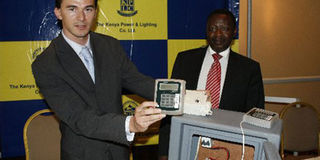Prepaid meters tame high power bills

Actaris chief executive officer Christophe Viarnaud explains how electricity PrePaid metering system works during their introduction on 20 February, 2009 at the Stanley Hotel. Kenya Power expects to convert all its post-paid meters to prepaid at a cost of 149 million dollars. PHOTO/FILE
What you need to know:
- Thanks to prepaid meters, customers do not receive "estimated" or bloated power bills.
- Kenya Power expects to convert all its post-paid meters to prepaid at a cost of 149 million dollars.
- Things for Kenya's electricity consumers are set to get better in future as the Energy Regulatory Commission (ERC) has outlined a plan to reduce the cost of power in the country.
NAIROBI,
Kenya's government worker Frida Munene never worries about electricity bills anymore.
This is because Munene, who lives in Kikuyu on the west of Nairobi, no longer needs to think about meeting a deadline every month so that power at her house is not disconnected.
But that is not the main reason why power bills do not fret her nowadays. The amount of money she pays for the essential service has drastically gone down, thanks to prepaid meters.
Ever since the meter was installed at her house over eight months ago, the mother of four said her power bills have not gone beyond 14 U.S. dollars.
"My bills have gone down considerably to the point that I no longer need to budget for electricity as I used to do before. This has made me love prepaid meters," said Munene on Tuesday.
When she started using the meter, Munene recounted she topped up 18 dollars knowing that it will not last her a month.
"I used to spend an average 24 dollars on electricity bills each month. This is what made me top up the 18 dollars, but the units I bought lasted for over a month," she said.
Since then, she has not topped up more than 14 dollars each month. "The money I spent on power bills is almost negligible because of the meter. For me they are the best things to happen in the sector ever since I stopped using a kerosene lamp for lighting," she said.
As many other Kenyans, Munene would initially be confronted by "inflated" bills once in a while from Kenya Power, which distributes electricity in the East African nation.
"There is a day I got a bill of 80 dollars yet I had not changed my consumption. I made endless trips to Kenya Power but they did not help me much. The best they did was to halve the bill, which to me was still too high," she said.
But Munene, as hundreds of other Kenyans using prepaid meters, has put those "dark days" behind her.
"These days I hear my colleagues who are still on post-paid meters complaining of inflated bills and I smile because for me things have changed for the better," said media worker George Ndunde.
Thanks to prepaid meters, Ndunde stopped getting "estimated" or receiving bloated power bills.
"I used to get estimated bills because Kenya Power people could come to my place and find I am not there. They would then send me estimated bills, some of which were very high considering the fact that I do not stay with my family, but prepaid meters have saved me this agony," said Ndunde, who relied on his landlord's post- office box to get the bill.
Ndunde's electricity expenses nowadays do not surpass 9 dollars.
"I used to spend nearly double that amount in the post-paid system. I like the new meters because they allow you monitor your consumption and you can even make those you stay with use electricity cautiously," he noted.
INSTALLED METERS
According to Kenya Power, it has installed about 300,000 prepaid meters mainly in Nairobi for its over 2.1 million customers.
The firm started installing the meters in 2009 and expects to reach more than 500,000 customers by 2015 in an exercise that will see the deepening of the billing system to boost the firm's cash flow.
The effect of prepaid meters on customers is evident at the firm's offices in the capital, where the list of people complaining about high electricity bills has gone down, according to a customer care employee.
Gone are the days when one would find dozens of furious customers complaining about "inflated" bills.
"Prepaid meters technology enables customers to manage their electricity consumption costs and the company to reduce commercial losses and congestion in the banking halls," noted the power firm in a report.
Kenya Power expects to convert all its post-paid meters to prepaid at a cost of 149 million dollars.
The firm is also banking on the gadgets to help cut unpaid power bills that currently stand at 106 million dollars.
"The company is installing prepaid and automatic meters as strategies to minimize the risk of non-collection of revenue. Consumers on prepaid meters use power they have paid for in advance helping the company to receive its revenues in full," says the firm.
However, as residents of major towns enjoy the benefits of prepaid meters, those up-country are yet to be reached.
"I pray the company moves faster and installs the meters across the country because my parents staying somewhere in Busia are being bombarded with high power bills and sometimes they have to travel to Kisumu office, over 50km away to resolve the issue," said NGO worker Peter Bandi.
BETTER DAYS AHEAD
Things for Kenya's electricity consumers are set to get better in future as the Energy Regulatory Commission (ERC) has outlined a plan to reduce the cost of power in the country.
On Tuesday, ERC said the cost of a unit of power will go down to 0.18 dollars per kilowatt hour (kWh) in December from the current 0.19 dollars.
The cost will reduce further to 0.16 dollars in July next year and to 0.14 by 2015.
Besides Kenya, other countries in the continent that have embraced prepaid meters include Zimbabwe, South Africa, Tanzania and Ghana.




